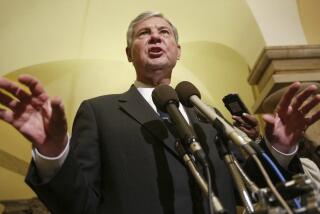David Graham; Helped Spark British Furor
- Share via
David Graham, who helped fuel a 1933 furor in Britain by playing a key role in an Oxford debating society’s declaration that “this house will in no circumstances fight for its king and country,” has died.
Graham died Aug. 12 at age 87, British newspapers reported this week.
Adolf Hitler had come to power in Germany just days before Graham, an Oxford undergraduate who was the librarian of the Oxford Union debate group, presented the motion for consideration. After a lively discussion the measure passed on a vote of 275 to 173.
The motion had little immediate impact, but three days later, after outraged comment in the Daily Telegraph, Conservatives in Parliament denounced the union--then at the height of its prestige--and Graham. A group of Oxford undergraduates--some news reports called them fascists--stormed the union’s headquarters and ripped the minutes of the debate from the record book. Politicians made efforts to have the matter expunged from the record.
Graham, who had drafted the pacifist motion and seconded it in debate, was able to rewrite the minutes from memory, and the record was maintained.
Some in England believed that the motion gave encouragement to Hitler in the days before the German chancellor made plans to gobble up countries in Europe.
For his part, Graham always insisted that the only motivation behind the measure was to spark lively debate in the Union. But he also admitted that the motion in part was a reaction to World War I, in which so many young men had suffered for their king and country.
After leaving Oxford, Graham was a schoolmaster briefly before joining the BBC. One of his first big tasks was adapting Tolstoy’s “War and Peace” for radio. In August 1939, his excellent German earned him a transfer to the foreign branch, and he spent the war broadcasting to Germany and occupied France.
Graham was born in India, where his father, Lancelot Graham, became the first governor of Sind province. Graham returned to Britain as a child for school and spent time in Germany studying the language.
A natural linguist, Graham could read Russian, Polish, Italian, Spanish and Hebrew and could converse in German, French and Danish. After leaving the BBC’s German section, he was the organizer of Russian programming, then deputy head of the East European Service in the 1950s. He also spent some time in the Arabic Service.
Colleagues remembered him as a fearless commentator. Just after the war, he upset the foreign office by exposing the fact that British occupation forces were trying to coerce the owner of a cosmetics firm in Germany into disclosing her secret formulas so Britain could boost its own cosmetics industry.
In 1947, Graham was sent to India to make a series of features for the network on British contributions to the subcontinent as it was preparing for partition. But that plan fell apart against the backdrop of savage fighting between Hindus and Muslims. Graham filed vivid reports on the massacres that, while informative to the British public, were somewhat embarrassing to the government,
The last few years of his career were spent filing thoughtful pieces on subjects such as Eurocommunism. Graham retired in 1971 and devoted his time to the Church of England and Liberal Party politics.
In one obituary a British newspaper, recounting the Oxford Union affair, called him not so much a pacifist as an “independent spirit fond of controversy.”
Graham is survived by two sons and a daughter.
More to Read
Sign up for Essential California
The most important California stories and recommendations in your inbox every morning.
You may occasionally receive promotional content from the Los Angeles Times.












